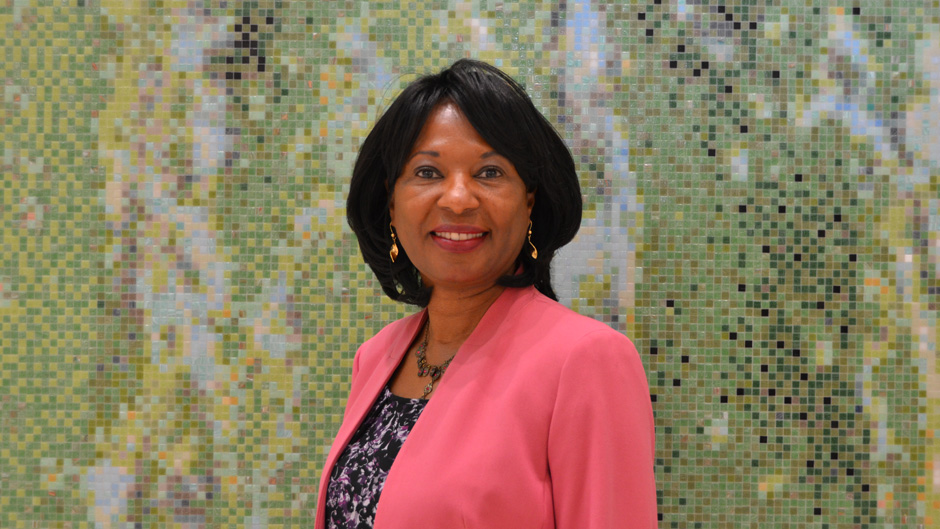Ruth Everett-Thomas’s career has taken her many exciting places. She describes the experiences dotting her résumé not as “work” but as “a wonderful journey.” Now celebrating her 30th year at the University of Miami—and her fifth year as assistant professor of clinical at the School of Nursing and Health Studies—Everett-Thomas is at the cusp of another new adventure. She was recently named assistant dean for simulation programs at S.H.A.R.E. Simulation Hospital Advancing Research and Education™.
“To be fresh, you have to change. Don’t let yourself be stagnant,” she says. “It doesn’t mean you have to leave anything, but you have to move within your profession or within your organization.”
A lifelong Miamian, Everett-Thomas always knew she wanted to work in health care. Her path to nursing and teaching, however, had some twists and turns. A love for chemistry in high school led to pharmacy school. When that didn’t feel right, she became a respiratory therapist. She spent five years working with patients on life support in the trauma unit at Miami’s Jackson Memorial Hospital. “This was when HIV was rising,” she says. “Just like with COVID, we were not sure at first how you could get it. You watched people your age dying in front of you. It was very scary, but it was a very rewarding career.”
From RN to Nurse Scientist
After earning her nursing degree, Everett-Thomas served as the neonatal pulmonary physiology laboratory manager for the Department of Pediatrics/Division of Neonatology at the University of Miami Miller School of Medicine. “This was on the cusp of a lot of new therapies with babies,” she says. “We were getting better at ventilating these babies, getting better with technology and medications.”
Everett-Thomas’s next step was a big one. For seven years she was the National Institute of Child Health and Human Development Neonatal Network Site Coordinator for the Department of Pediatrics/Division of Neonatology, overseeing the initiating National Institutes of Health trials. “That role really opened my eyes to research at the national level,” she says. She was among the first nurses invited to join the Neonatal Network Steering Committee. “Before, it was all physicians,” she recalls. “It was very nice to see that they would value our input.”
Inspired by the advancements in infant survival that she played a part in, Everett-Thomas decided to go beyond her master’s and earn a PhD degree. “I really wanted to be a PI,” she says. Her doctoral dissertation focused on improving Code Blue and Rapid Response team performance in clinical and acute care settings. Ironically, pursuing research at that level meant leaving her intensive National Institutes of Health position. There was no time for both. “That’s when I found the UM/JMH Center for Patient Safety,” she explains. “The department had just opened in 2006, and I joined them the following year.”
At the Forefront of Simulation
During her decade as a research and training specialist at the Center for Patient Safety, Everett-Thomas developed simulation interventions incorporating Team-STEPPS® strategies to promote patient safety and improved patient outcomes. She brings that expertise to her new post as assistant dean for simulation programs. “There’s so much opportunity,” she says. “We’re on the cutting edge. My goal is to push S.H.A.R.E. forward where everything kind of connects because, as you see, my life is connectedness. I’ve been in patient safety, I’ve been in the hospital, I’ve been at the bedside, I’ve been in research, so I see the totality of it.
“It’s not just a simulation hospital building that stands by itself,” she continues. “I would like to see it run as a hospital, where the patient comes in through the ER, we see them in the ER and then we put them in the ICU or a regular room and see the whole patient flow because now you can see where the errors, if there are going to be any errors, can occur. Since we have the students from their very beginning, we can instill this into them before they get to the hospital.”
‘It’s All About Communication’
As a leader, Everett-Thomas aims to identify where people can “shine best.” At S.H.A.R.E., she is responsible for coordinating day-to-day operational aspects as well as contributing to the development of policies, procedures, scheduling, and practices. A Certified Health Care Simulation Educator (CHSE), she works closely with faculty in designing simulation curricula for entry-to-practice baccalaureate nurses, including scenario design, assessment, and evaluation.
Everett-Thomas approaches her sizable role with characteristic positivity and pragmatism. “It’s doable once we get our goal and our focus of what we want to do,” she says. “We can make all the connections come together.” In addition to keeping pace with constantly evolving simulators, technology, computers, and protocols, she is teaching interprofessional nursing this fall, which is all about “how to work on a team,” she explains. “It’s all about communication, or making that team communication better, whether it’s verbal or nonverbal.”
Although teaching was not always on her radar, Everett-Thomas has been doing it since earning her PhD in 2012 and now finds her students to be the most rewarding aspect of her career. “The students are amazing. They give you new energy!” she exclaims. “To see them from the beginning of their academic experience to the end—how proud they are of themselves, how much they have gained in knowledge and skills—they’re ready to conquer the world! That’s the most rewarding—to know we put out another good group of nurses.”
